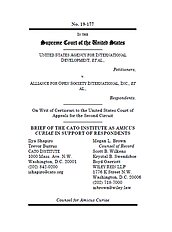Learn more about Cato’s Amicus Briefs Program.
In 2003, Congress passed the Leadership Act, which authorized the U.S. Agency for International Development (USAID) to distribute billions of dollars to HIV/AIDS focused charities. As a condition of funding, organizations were required to publicly take, and maintain, an anti-prostitution stance. The Alliance for Open Society International and Pathfinder International sued USAID, arguing that this requirement went beyond directing the funds’ use (such as prohibiting using the funds to promote prostitution legalization) to limiting their freedom of speech.
While these organizations aren’t pro-prostitution, their work necessarily involves working directly with sex workers. Such a public stance, they argue, would hinder more than help. The case went to the Supreme Court in 2013, and in Agency for International Development v. Alliance for Open Society International (AOSI I) the Court’s majority held (with guidance from the Cato Institute) that conditioning funding on parroting Congress’s policy stances is an unconstitutional burden on free speech.
Now, the Supreme Court is hearing AOSI II, and the same parties are arguing the same provision of the same law. Why did the Court take up the same issue a second time? Many charitable organizations, like other business models, have international branches that are organized under foreign law. In fact, many countries, including the United States, require that a charity incorporate itself in the country before it can perform charity there. But despite the Court’s opinion in AOSI I, USAID continues to apply the anti-prostitution requirement to foreign affiliates of charitable organizations. While legally distinct, the charities argue that this puts a significant burden on their ability to have a single, international mission.
Can USAID compel the speech of foreign entities even if those entities functionally share a public face? Should a formalistic approach be taken to differentiating the affiliates, or should the Court consider the practical fact that these organizations are clearly identified together? The Cato Institute has submitted an amicus brief defending charitable organizations’ ability to maintain their own stance on public policy. The speech of one affiliate is imputed to the whole organization. Indeed, Cato argues that the distinction argued by the government was already considered in AOSI I, where the court said that “if the affiliate is more clearly identified with the recipient, the recipient can express those beliefs only at the price of evident hypocrisy.”
The government is trying to draw a formalistic line between various legal entities in order to compel some organizations to espouse the government’s message. But while the U.S. Red Cross, the Polish Red Cross, and the Swiss Red Cross may be legally distinct entities, to an observer it’s all the Red Cross. Freedom of speech shouldn’t depend on subtle and legalistic distinctions of corporate law.

This work is licensed under a Creative Commons Attribution-NonCommercial-ShareAlike 4.0 International License.
